Uttar Pradesh Switch to Hindi
UP Police’s ‘Operation Savera’
Why in News?
The Uttar Pradesh Police has launched ‘Operation Savera’ in the Saharanpur region to curb drug trafficking and promote a drug-free society.
- The initiative, directed by CM Yogi Adityanath and DGP Rajeev Krishna, targets the entire chain of illegal narcotics, from manufacturers to peddlers.
Key Points
- Objective: The operation focuses on illegal drug manufacturers, intermediaries, suppliers, and peddlers across the three districts of the Saharanpur range.
- Police will dismantle trafficking networks, targeting both forward and backward linkages of the drug trade.
- Legal Mandate: Strict legal action will be taken under the Narcotic Drugs and Psychotropic Substances (NDPS) Act, 1985, and Prevention of Illicit Traffic in Narcotic Drugs and Psychotropic Substances (PITNDPS) Act, 1988, including confiscation of properties acquired through illicit drug activities.
- Ongoing NDPS cases will be reviewed to ensure convictions of guilty persons.
- Awareness: Awareness campaigns will educate society, especially students, about the harmful effects of drug abuse.
- Visits to de-addiction centers are planned to assess facilities and challenges, and coordinate with departments for rehabilitation support.
Note: Earlier, the Kanpur Police had launched ‘Operation Mahakal’ on 5th August 2025 to crack down on the land mafia, extortion gangs, and influential individuals supporting them.
Uttar Pradesh Switch to Hindi
UP’s 1st Green Hydrogen Plant
Why in News?
Uttar Pradesh Chief Minister Yogi Adityanath inaugurated the state's first green hydrogen plant and the second of its kind in the country at Khanimpur village, Gorakhpur district.
India's Green Hydrogen Milestones
- Kandla Port in Gujarat is the site of India's first Make-in-India Green Hydrogen Plant, advancing the country's Net-Zero goals.
- Jindal Stainless Limited in Hisar is India's first off-grid green hydrogen plant dedicated to the stainless steel industry, making it a global first for the sector.
- Adani Group commissioned India's first off-grid 5 MW green hydrogen pilot plant in Kutch, Gujarat, pioneering renewable-powered hydrogen production.
Key Points
- About: The plant, set up by Torrent Gas and Torrent Power, marks a significant milestone in India's transition to clean energy.
- As part of a pilot project, the plant will blend up to 2% green hydrogen with natural gas (CNG and PNG), which will be supplied to domestic households, CNG stations, and industries via the local gas grid.
- Significance: The project is the largest green hydrogen and natural gas blending initiative in the country's city gas distribution sector, expected to cut carbon emissions by 500 tonnes annually and establish Uttar Pradesh as a key hub for green hydrogen due to its abundant water resources.
- Green Hydrogen Policy: The Uttar Pradesh Green Hydrogen Policy 2024 enables Ease of Doing Business by promoting investments and setting up of Green Hydrogen / Green Ammonia production facilities and Green Hydrogen-based product manufacturing units.
- Uttar Pradesh envisions taking the production capacity of Green Hydrogen / Green Ammonia up to 1 million metric tonnes per year by 2028.
- The policy includes a 30% capital subsidy, which can go up to 40% for the first four projects in the state.
Green Hydrogen
- Green hydrogen is produced by splitting water into hydrogen (H₂) and oxygen (O₂) through electrolysis powered by renewable energy sources like solar power, or via biomass gasification.
- Its uses include fuel cell electric vehicles (FCEVs), industrial uses such as fertilizers and the refineries sector, and transportation sectors like road and rail.
- Other Types of Hydrogen:
Uttar Pradesh Switch to Hindi
Eternal Flame of Homeopathy Award to Dr PK Shukla
Why in News?
Senior homeopathic physician Dr PK Shukla from Lucknow was awarded the Eternal Flame of Homeopathy Award for his outstanding contributions to homeopathy.
- The award was presented by cricketing legend Sunil Gavaskar at the 4th All India Homeopathy Research Summit 2025, held on 16th August 2025 at JW Marriott, Goa, and organised by Burnet Homeopathy Private Limited.
Homeopathy
- Homeopathy is a medical system that stimulates the body’s natural healing ability, using highly diluted substances to enhance effects and reduce side effects.
- Introduced in India in the 18th century, World Homeopathy Day is observed every 10th April to honor its founder, Dr. Hahnemann.
Note: Crosspathy is the practice where healthcare professionals provide treatments or prescribe medicines beyond their recognized expertise, such as AYUSH practitioners (Ayurveda, Yoga, Naturopathy, Unani, Siddha, Homeopathy) performing procedures or prescribing drugs usually reserved for allopathic (modern) medicine.
Uttar Pradesh Switch to Hindi
UP Universities Shine on Sodhganga Portal
Why in News?
On University Grants Commission’s (UGC) Sodhganga portal, three universities from Uttar Pradesh secured places among the country’s Top 10 institutions in terms of uploaded research theses.
Key Points
- On the Shodhganga portal, which hosts over 6,20,000 theses from 840 universities nationwide, Uttar Pradesh’s institutions have emerged as significant contributors, with Aligarh Muslim University (AMU), Kanpur University, and Banaras Hindu University (BHU) securing prominent positions—underscoring the state’s growing emphasis on higher education, research, and academic excellence.
- Top 10 National Universities:
- Anna University (17028 theses)
- University of Madras (15396)
- University of Calcutta (14837)
- Savitribai Phule Pune University (13403)
- University of Mumbai (12527)
- Andhra University (10736)
- Aligarh Muslim University (10709): 7th among top contributors (1st in UP).
- Chhatrapati Sahuji Maharaj University (10279): 8th among top contributors (2nd in UP).
- Panjab University (9890)
- Banaras Hindu University (9600): (3rd in UP).
- Other UP Universities’ Contributions:
- Lucknow University: 8,683 theses
- Chaudhary Charan Singh University, Meerut: 3,645 theses
- Bundelkhand University: 2,335 theses
- Pt. Deendayal Upadhyay Gorakhpur University: 1,161 theses
- Dr. APJ Abdul Kalam Technical University, Lucknow: 462 theses
Shodhganga: A Digital Repository of Indian Theses
- About: Shodhganga is a digital repository of Indian electronic theses and dissertations, hosted and maintained by the INFLIBNET Centre.
- It provides open access to M.Phil. and Ph.D. research, ensuring wider visibility, reducing duplication, and enhancing research quality across Indian universities.
- Mandate: Under the UGC (Minimum Standards & Procedure for Award of M.Phil./Ph.D. Degree) Regulation, 2009 (amended 2016), all researchers are required to submit electronic versions of their theses to facilitate global access and preservation.
- Significance:
- “Shodh” means research; “Ganga” symbolizes India’s rich cultural heritage. Together, Shodhganga represents the reservoir of Indian intellectual output.
- It prevents duplication of research, promotes quality, and preserves scholarly work digitally.
- University Integration:
- Universities can maintain their own institutional repositories while using Shodhganga as a central backup.
- Metadata from distributed repositories is harvested centrally to provide unified access to all theses.
National Current Affairs Switch to Hindi
Death Anniversary of Atal Bihari Vajpayee
Why in News?
Prime Minister Narendra Modi, along with President Droupadi Murmu and other dignitaries, paid floral tributes to former Prime Minister Atal Bihari Vajpayee on his seventh death anniversary (16th Aug) at his memorial, ‘Sadaiv Atal’, in New Delhi.
Key Points About Atal Bihari Vajpayee
- Atal Bihari Vajpayee: Born on 25th December, 1924 in the erstwhile princely state of Gwalior (now a part of Madhya Pradesh).
- He entered in national politics during the Quit India Movement (1942) which hastened the end of British colonial rule.
- Professional Career: In 1947, Vajpayee started working as a journalist for newspapers of Deendayal Upadhyaya — Rashtradharma (a Hindi monthly), Panchjanya (a Hindi weekly) and the dailies Swadesh and Veer Arjun.
- Later, influenced by Syama Prasad Mookerjee, Vajpayee joined the Bharatiya Jana Sangh in 1951.
- Political Journey: He served as India’s Prime Minister three times (1996; 1998–2004): first term (16th May – 1st June 1996, about 13 days), second term (19th March 1998 – 13th October 1999), and third term (13th October 1999 – 22nd May 2004).
- He was elected nine times to the Lok Sabha and twice to the Rajya Sabha.
- Awards and Recognition: He was conferred with the country's highest civilian honour, the Bharat Ratna in 2015 and second-highest civilian honour, the Padma Vibhushan in 1994.
- As a parliamentarian, Vajpayee was awarded with the Pandit Govind Ballabh Pant Award for Best Parliamentarian in 1994, which defines him as "a role model par excellence for all legislators."
- His birthday is observed as Good Governance Day.
- Demise: A revered former Prime Minister, he passed away on 16th August 2018.
- Key Achievements:
- He launched the Golden Quadrilateral Project, creating a network of four national highways connecting Delhi, Mumbai, Chennai, and Kolkata.
- Through second-generation economic reforms, he liberalized India’s economy, fostering industrial growth and attracting foreign investment.
- He led the nation during the Pokhran Nuclear Tests (1998), which established India as a nuclear power while emphasizing peace and non-aggression.
- He inaugurated Pradhan Mantri Gram Sadak Yojana (PMGSY) in 2000 for better connectivity and transportation in rural India.





 PCS Parikshan
PCS Parikshan




